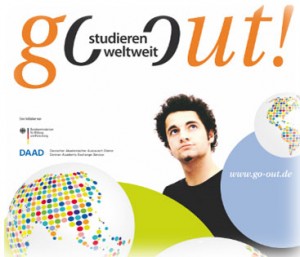
In today’s show the emphasis is on students who decide to spend some quality time abroad. What are their choices, how do students need to prepare themselves, when should they start with their intercultural preparations? Most students, whether they take a Bachelor or a Master course, have the opportunity to go abroad for some time during their studies. Our interviewees tell us what the benefits of such a study abroad period can be.
absolutely welcome:
At most universities the international offices try to highlight students’ opportunities for going abroad by celebrating an international week at least once a year. The university invites representatives from their partner universities who can then explain and advertise their study programmes and answer specific student questions concerning the best choice of courses, the credit points which students can gain during their stay abroad and also questions concerning accommodation or living costs in their countries. Listen to Prof. Henzler, president of the University of Applied Sciences Koblenz as she welcomes the delegations from the different partner universities on the first day of the international week.
absolutely useful:
From the student perspective the presence of the foreign guests offers a number of opportunities. They can follow lectures in foreign languages, can get to know teachers and administrators from the partner university before they arrive there and make informed choices as to which university would be the best one to go to. We listen to one of the student representatives of the “go-out”-initiative (German Academic Exchange Service – DAAD). Gerrit tells us that he sees the main benefits of these periods abroad in the fact that they create new and unexpected opportunities to expand your own personality and that well-documented experience abroad is a great plus when you are looking for a new job – because it seems to be a strong signal to the prospective employer that you are motivated, flexible, and that you show initiative and speak foreign languages.
absolutely integrated:
Most universities have orientation weeks where all foreign students get together and get basic information or do excursions around the university in order to facilitate their integration. Some universities have “buddy programs” where the incoming foreign students are paired with local students whose task it is to integrate the newcomers as quickly and as thoroughly as possible. Adelheid Korpp, who is in charge of the “incoming students” at RheinAhrCampus tells us what the university offers to make sure that the students from the partner universities have the best start, get integrated quickly and, if possible, feel at home in their new surroundings right from the beginning of their stay.
absolutely strategic:
Students should prepare themselves interculturally for their stay abroad before they arrive at their new destination. Barbara Neukirchen, who looks after the “outgoing students” at RheinAhrCampus and coaches them during their application process for universities and scholarships tells us how students can plan a successful stay abroad if only they start the planning phase early enough.
absolutely prepared:
In our last interview Carsten Ritterath a Bachelor student of business administration reports about his preparation for an internship in England. His football coach helped him find the English organisation where one of his tasks will be to compare English and German approaches to health management in companies. Carsten has applied for a scholarship from ERASMUS-placements and he tells us what he needed to do in order to apply for this. He wrote a letter of motivation, a curriculum vitae, he took part in an intercultural seminar and he had to pass an English test. We are keeping our fingers crossed for him to get the scholarship in the end because accommodation in London can be quite expensive.
Our next show will be coming to you on 22 August from Anne Fox in Denmark.
Und bleiben Sie absolut interkulturell!
The host and editor of this show is: Dr. Laurent Borgmann


